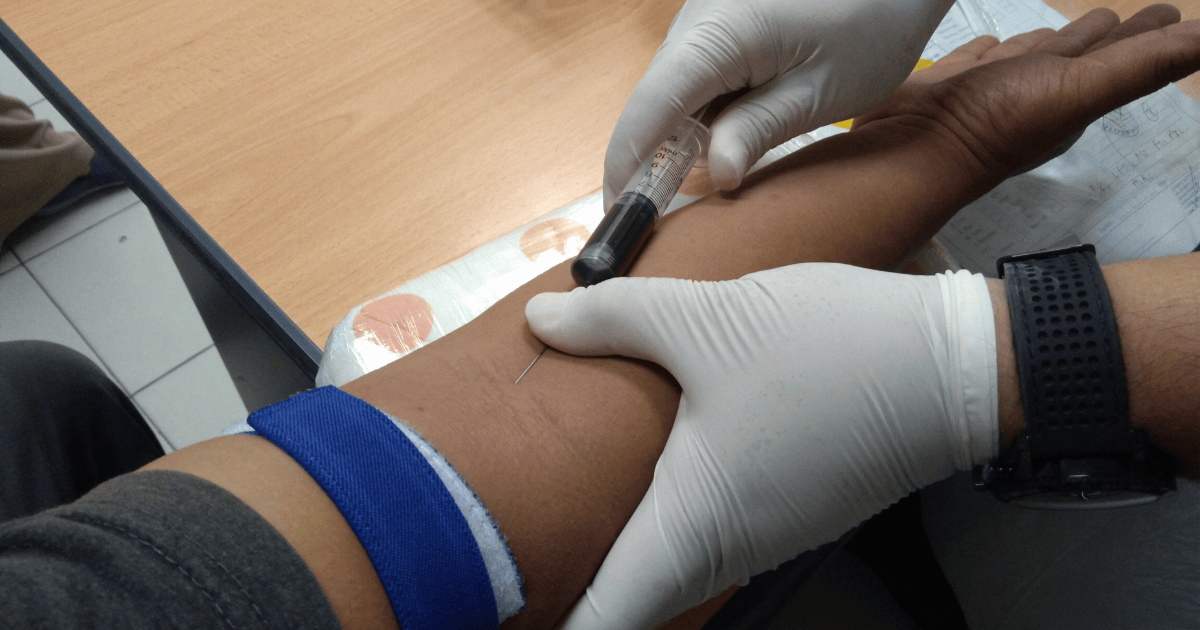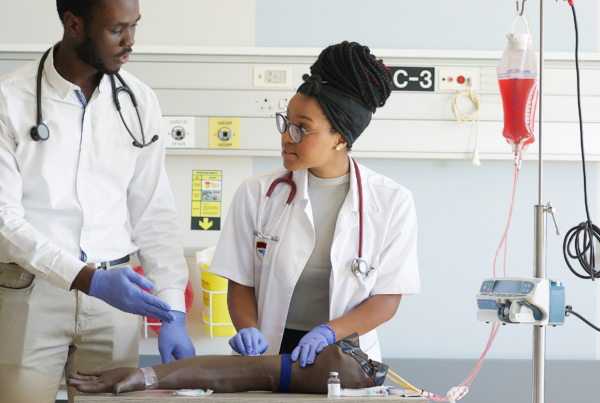If you’re aspiring to make a meaningful impact in the healthcare field, obtaining a phlebotomy certification is a significant step toward achieving your goal. Certified phlebotomists play a critical role in patient care by collecting blood samples for medical testing, research, and donation. With numerous certification options available, choosing the right one can pave the way for a fulfilling career.
In this comprehensive guide, we’ll explore what phlebotomy entails, the benefits of certification, and the top certifications you can pursue to advance your career.
| Key Takeaways |
| Phlebotomy is vital in healthcare. It needs precision, communication, and safety. |
| Certification enhances employability, salary potential, and professional recognition. |
| There are multiple certification options, catering to different training and experience levels. |
| Continuous education is vital to maintaining certifications and staying updated in the field. |
 What is Phlebotomy?
What is Phlebotomy?
The process of taking blood from donors or patients is known as phlebotomy. It is used for testing, transfusions, research, and donations. This essential medical procedure plays a pivotal role in the broader healthcare system by enabling accurate diagnosis, effective treatment plans, and life-saving transfusions. In this field, a phlebotomist is a healthcare professional. These skilled practitioners are integral to hospitals, clinics, laboratories, and blood donation centers. Their duties include:
- Explaining procedures to patients and addressing their concerns.
- Performing venipunctures (drawing blood from veins) and other techniques with precision.
- Monitoring patient comfort during and after the procedure.
- Maintaining equipment and ensuring cleanliness and safety.
- Recording vitals and handling specimens for lab processing.
Usually, phlebotomists must finish a phlebotomy training program and have a high school degree or its equivalent. This training can last between four months and a year. For medical professionals such as nurses, obtaining a phlebotomy certification can enhance their qualifications and open new career opportunities.
Why Pursue a Phlebotomy Certification?
Having a phlebotomy certification verifies your abilities and expertise, which makes you stand out in a crowded employment market. For example, many certified phlebotomists report significant increases in job prospects and salary offers, with some professionals earning up to 20% more than their uncertified peers. Additionally, certifications often serve as a prerequisite for specialized roles, helping practitioners stand out in the field. Some states mandate certification for practicing phlebotomy, while employers often prioritize certified candidates. Benefits of earning a certification include:
- Increased employability and access to better-paying roles.
- Recognition as a qualified professional in the field.
- Opportunities for career growth in healthcare.
12 Types of Phlebotomy Certifications
Here are the most recognized phlebotomy certification programs and their requirements, carefully selected based on their credibility, industry recognition, and ability to significantly enhance job prospects and salary potential for candidates:
1. Phlebotomy Technician Certification (PBT-ASCP)
The ASCP offers this certification, which needs one of the following:
- Completion of an approved phlebotomy program.
- You need 100 hours of clinical practice and 40 hours of classroom work.
- One year of experience as a phlebotomist.
- A medical degree with phlebotomy training.
There are 80 multiple-choice questions in the two-hour test.
2. Certified Phlebotomy Technician (CPT-NHA)
The National Healthcareer Association (NHA) offers this certification with the following levels:
- Limited Phlebotomy Technician.
- Certified Phlebotomy Technician 1 and 2.
Eligibility requires a high school diploma, 20 hours of classroom training, and a course completion certificate.
3. Registered Phlebotomy Technician (RPT-AMT)
The American Medical Technologists (AMT) award this certification to candidates who meet one of these criteria:
- Completing an authorized course within the past four years.
- Over 1,040 hours of experience in three years.
- Training as a health educator for three years.
The exam has basic phlebotomy questions. It can be retaken four times by candidates.
4. Certified Phlebotomist Technologist (CPT-NPA)
The National Phlebotomy Association (NPA) provides this certification for those who complete 160 hours of classroom instruction and 200 hours of clinical practice, reflecting its rigorous requirements that are highly regarded within the industry. This ensures candidates are well-prepared for real-world challenges and recognized for their extensive training. The two-hour multiple-choice exam ensures candidates meet rigorous standards.
5. Phlebotomy Technician Certificate (PTC-ASPT)
To earn this certification from the American Society of Phlebotomy Technicians (ASPT), you must:
- Possess either a year’s worth of part-time or six months’ worth of full-time experience.
- Complete a phlebotomy training program.
- Five skin punctures and a minimum of 75 venipunctures must be recorded.
The exam includes theoretical and practical components, with annual continuing education requirements.
6. Phlebotomy Technician Certification (PTC-AMCA)
The American Medical Certification Association (AMCA) is the organization that issues this certification. It requires:
- Completion of a phlebotomy program.
- At least 30 venipunctures and 10 capillary punctures.
The 100-question exam evaluates professionalism, regulatory compliance, infection control, and specimen handling.
7. Certified Phlebotomy Technician (CBT-ACA)
In order to receive certification from the American Certification Agency for Healthcare Professionals (ACA), candidates must:
- Hold a high school diploma.
- Complete phlebotomy training.
- Document 100 venipunctures and 10 skin punctures.
A practical and theoretical exam must be passed to earn this credential.
8. Phlebotomy Technician Certificate (PTC-AAH)
Offered by American Allied Health (AAH), this certification is available to those who:
- Complete a training program.
- Have one year of experience or military training.
- Possess certification from another body.
9. Chicago School of Phlebotomy Certification Program
This program provides both seven-week standard and four-week accelerated tracks. It includes advanced venipuncture techniques. Candidates must take in-person classes.
10. American National University Phlebotomy Program
ANU offers an online certification program accredited by the Distance Education Accrediting Commission. The program spans 36 credit hours and prepares students for internships to gain hands-on experience.
11. Phlebotomy Technician (NCPT)
To be certified by the National Center for Competency Testing (NCCT), one must:
- Within five years of beginning or completing a program in phlebotomy.
- One year of recent experience.
12. Certified Phlebotomy Technician (NPS)
The National Performance Specialists (NPS) provide this certification to candidates with a high school diploma, training completion, and proof of 30 venipunctures and 10 capillary punctures.
Role of Phlebotomy in Modern Healthcare
Phlebotomy is a cornerstone of modern healthcare, enabling critical diagnostics and treatments. Blood tests identify conditions such as diabetes, anemia, and infections, guiding healthcare providers in crafting accurate treatment plans. Moreover, phlebotomy plays a crucial role in research and public health by supporting blood donation drives, which save countless lives annually. This interconnectedness highlights why trained and certified phlebotomists are indispensable to healthcare teams.
Skills Required to Excel in Phlebotomy
A successful phlebotomist blends technical expertise with soft skills.
- Technical Skills: Proficiency in venipuncture, specimen handling, and infection control protocols.
- Soft Skills: Communication and empathy are vital for calming nervous patients, particularly children and those with a fear of needles. Training programs often emphasize these dual aspects, preparing candidates for real-world scenarios.
How Certifications Improve Careers
Beyond increasing job prospects, certifications often lead to better patient outcomes and improved workplace safety. Certified phlebotomists bring credibility and trustworthiness, which is especially important in high-stakes environments like hospitals and research labs. Employers recognize certifications as indicators of both dedication and competence.
Emerging Trends in Phlebotomy
The field of phlebotomy is evolving with technology, including the development of automated blood collection devices and wearable diagnostic tools. These innovations enhance accuracy and patient experience. Also, demand for skilled phlebotomists will grow. An aging population and greater healthcare access will drive this. Staying updated with these trends ensures that phlebotomists remain competitive and indispensable.
FAQs
What is the duration of training to become a certified phlebotomist?
Training programs typically take 4 months to a year to complete, depending on the institution and program structure.
Is phlebotomy certification required in all states?
No, certification requirements vary by state. Some states, like California, mandate certification, while others do not.
What is the average salary for certified phlebotomists?
Salaries range from $30,000 to $45,000 annually, depending on location, experience, and workplace.
Can I pursue phlebotomy certification online?
Yes, several institutions offer online certification programs that include practical training components.
What are the career advancement opportunities for phlebotomists?
Certified phlebotomists can advance to lab techs, medical assistants, or healthcare educators.
Conclusion
Earning a phlebotomy certification is an investment in your future, offering numerous opportunities for growth in the healthcare industry. Whether you’re starting your journey or looking to enhance your skills, Phlebotomy Now School provides the resources and support you need to succeed. Start your certification path now to realize your full potential in the fulfilling phlebotomy industry.
Start Your Phlebotomy Journey Today!
For those eager to launch their phlebotomy career quickly and effectively, Phlebotomy Now School’s 1-day certification course in Texas is an ideal solution. This program combines hands-on training with expert instruction, ensuring students gain the skills and confidence needed to succeed in this essential healthcare role.
Enroll today! It’s the first step to becoming a certified phlebotomist.







